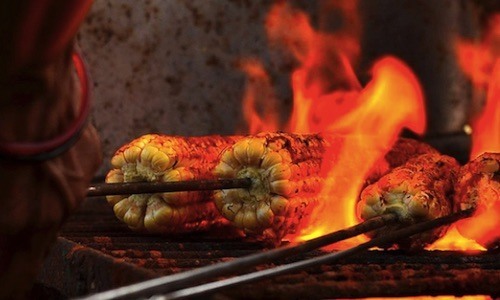
India’s Food Supply at Risk of GMO Contamination After Lifting 16-Year Corn Import Ban

The United Nations expects India to surpass China as the world’s most populous country. With so many more mouths to feed as well as a growing appetite for meat, advocates say that the importation or cultivation of GMO crops such as corn, wheat and soy could ensure food security not only for humans, but for livestock and livestock products (such as eggs, dairy, etc.).
Increasingly more of middle class in #India eat "non-Veg" – must increase growing or importation of GMO soy & corn! pic.twitter.com/1oM2h3zZ1V
— Channa Prakash (@AgBioWorld) August 18, 2015
Coupled with a growing population, the volatility of climate change has already left a marked impact on the country’s crops and has lowered yields. As Live Mint noted, India decided to lift its 16-year-ban on corn imports due to shortage in production caused by two straight years of drought.
Reuters reported earlier this month that India is weighing it’s first genetically modified food crop, mustard. According to the report, “if a commercial launch of GM mustard is allowed, it could pave the way for other food crops such as corn varieties developed by Monsanto, in one of the world’s biggest farm markets.”
On the other hand, as Nature reported:
India has more than 100 million farmers, who are concerned that if GM crops become prevalent, their livelihoods and the nation’s food supply will increasingly rely on expensive, rapidly changing and proprietary seed technologies owned by large corporations, says Glenn Stone, an environmental anthropologist at Washington University in St. Louis, Missouri.
Critics cite the rampant use of herbicides and pesticides on GMO crops. Food security activist and outspoken GMO opponent Dr. Vandana Shiva wrote in The Asian Age (via MintPressNews), that GMO mustard seed requires the use of potentially toxic herbicides.
“We need to stop the insanity of transforming mustard—the symbol of spring and abundance in our culture—into a toxic crop with terminator genes, sprayed with lethal herbicides that kill everything green and directly damage our health,” she wrote.
#Monsanto responsible for Vidharba #BtCotton farmers suicides #Pepsi for potato farmers suicides
License to loot? https://t.co/ezTvxMJPTi— Dr. Vandana Shiva (@drvandanashiva) February 17, 2016
Currently, Bt cotton is the only genetically modified crop allowed for commercial cultivation, a crop that has been tied to the suicides of 270,000 Indian cotton farmers have since 1995. These farmers are trapped in a cycle of debt due to high prices of GMO seeds, as the The Guardian reported:
India is experiencing its biggest wave of suicides among cotton farmers. Some observers have linked the deaths to the introduction of costly genetically modified seeds, fertilizers and insecticides. Many farmers turn to loan-sharks to pay for these items, however unfavourable weather conditions, or even a mere dip in the global price of cotton, can spell disaster for growers.
YOU MIGHT ALSO LIKE
French Ecology Minister Calls for Ban on Glyphosate Formulations
Organic Farmer Dealt Final Blow in Landmark Lawsuit Over Monsanto’s GMO Contamination
Coffee Farmers Sue Monsanto for Hiding Cancer-Causing Impact of Glyphosate

 233k
233k  41k
41k  Subscribe
Subscribe 